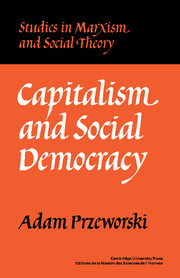Book contents
- Frontmatter
- Contents
- Acknowledgments
- Introduction
- 1 Social Democracy as a Historical Phenomenon
- 2 Proletariat into a Class: The Process of Class Formation
- 3 Party Strategy, Class Organization, and Individual Voting
- 4 Material Bases of Consent
- 5 Material Interests, Class Compromise, and the State
- 6 Democratic Capitalism at the Crossroads
- 7 Exploitation, Class Conflict, and Socialism: The Ethical Materialism of John Roemer
- Postscript: Social Democracy and Socialism
- References
- Name Index
- Subject Index
5 - Material Interests, Class Compromise, and the State
Published online by Cambridge University Press: 05 June 2012
- Frontmatter
- Contents
- Acknowledgments
- Introduction
- 1 Social Democracy as a Historical Phenomenon
- 2 Proletariat into a Class: The Process of Class Formation
- 3 Party Strategy, Class Organization, and Individual Voting
- 4 Material Bases of Consent
- 5 Material Interests, Class Compromise, and the State
- 6 Democratic Capitalism at the Crossroads
- 7 Exploitation, Class Conflict, and Socialism: The Ethical Materialism of John Roemer
- Postscript: Social Democracy and Socialism
- References
- Name Index
- Subject Index
Summary
Introduction
This chapter examines the conflict between capitalists and wage-earners over the realization of material interests in advanced capitalist societies. The central question is whether wage-earners' pursuit of their material interests will necessarily lead them to opt for socialism.
This is an old question and the responses to it are familiar, emphatic, and confused. One response is attributed to Marx and is, in fact, found in some of his writings, particularly in Wage Labour and Capital. There Marx maintained that since the national product generated by the capitalist sector of the economy is divided into a part appropriated by capital as profit and a part paid in exchange for labor power as wages, the shares of capital and labor are inversely related. That much is obviously true, since the product is by definition constant at any instant of time. But Marx went much farther. He claimed that even when accumulation is viewed in dynamic terms, in fact even when workers' conditions are improving, the conflict over distribution retains an essentially noncooperative character. For Marx this conflict is irreconcilable within the confines of the capitalist society.
The political conclusion Marx and most of his followers drew from this analysis is that workers' pursuit of material interests must lead them to realize that these interests can be advanced if and only if the entire system of wage labor is abolished. As Luxemburg (1970b: 30) put it in 1900, “as a result of its tradeunion and parliamentary struggles, the proletariat becomes convinced of the impossibility of accomplishing a fundamental social change through such activity and arrives at the understanding that the conquest of political power is unavoidable.”
- Type
- Chapter
- Information
- Capitalism and Social Democracy , pp. 171 - 204Publisher: Cambridge University PressPrint publication year: 1985
- 19
- Cited by



